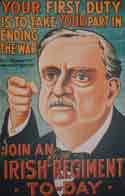Arthur McBride, or Arthur McBride and the Sergeant, as it is sometimes called, is one of many anti-war and anti-recruiting songs which were popular in Ireland in the 19th century.
Paul Brady ‘definitive version
Videos
Lyrics and chords
Others include Mrs McGrath, Johnny I Hardly Knew Ya and The Kerry Recruit.
Me and my cousin Arthur McBride

The song tells the story of two young cousins who are taking a relaxing stroll one morning.
They happen to meet a British army sergeant and two of his men, who are trying to sign up new recruits. Arthur McBride stands out from many other anti-recruiting songs of the because of the polite, calm nature of the lyrics – at least at the beginning.
The sergeant does everything he can to persuade the young men to enlist, telling them a soldier leads a fine life, can attract a beautiful young wife, has plenty of money, is always decent and clean, and has plenty of good food to eat.
All is fine until the sergeant mentions that soldiers also have fine clothes to wear.
Says Arthur – I wouldn’t be proud of your clothes
Arthur tells the sergeant not to be so proud of his clothes because he is only borrowing them. They belong to the army and would be taken away when he ceases to be a soldier.
And far from having an easy carefree life, the soldier is effectively enslaved, for as Arthur is quick to point out, if the sergeant ever decided to change his military clothes he would be flogged the next morning for indiscipline.
Arthur goes on to say they are single and free and have no desire or need to take up the sergeant’s offer.
We would get shot without warning
Very calmly but very firmly, Arthur is countering the sergeant’s argument as to why they should join the army.
He then comes to his final point which becomes the crux of the song. Arthur tells the sergeant they are declining the offer because he knows that the army would have no hesitation in sending them to France where they would get “shot without warning”.
I neither will take it from spalpeen or brat

The sergeant is furious; not so much because the cousins won’t enlist but because they dare to challenge him with calm and rational argument. His reaction shows that he is not used to people standing up to him and he doesn’t like it.
Spalpeen comes from the Irish word for a rascal or layabout.
He calls the cousins spalpeens and brats, which means he finds them impudent and inferior.
Having lost the reasoned debate, the sergeant threatens violence but the cousins have the beating of him there was well. They attack the sergeant and his men with their shillelaghs and overpower them.
We made a football of his rowdy dow dow
The soldiers’ rapiers are thrown in the sea, and the drummer suffers the indignity of seeing his drum, his rowdy dow dow, turned into a football and kicked into the sea.
Throwing away the weapons is symbolic of rejecting warfare, and throwing away the drum, which helped regulate the soldier’s day, emphasises that the cousins are rejecting military life.
These would have been popular statements in 19th century Ireland where recruiting sergeants were seen as hate figures. Unfortunately for many young Irishmen at that time, they had no choice but to join the army because the poverty of the country meant there was no other way for them to make a living.
Origins of Arthur McBride

Arthur McBride is a traditional song that first was collected in Ireland by Patrick Joyce in 1840. It was also collected in Donegal by George Petrie. McBride was a popular name in Donegal and many researchers believe that was probably where the song originated.
However, McBride is also a common Scottish name and there are many references to the song in Scotland. There are also references to it in England in the 19th century where it was published several times as a broadside ballad.
No one knows for certain where the song came from but it is now most closely associated with Ireland, mainly through the recordings of artists like Paul Brady.
Arthur McBride
Paul Brady ‘definitive’ version
Videos
Lyrics and chords
